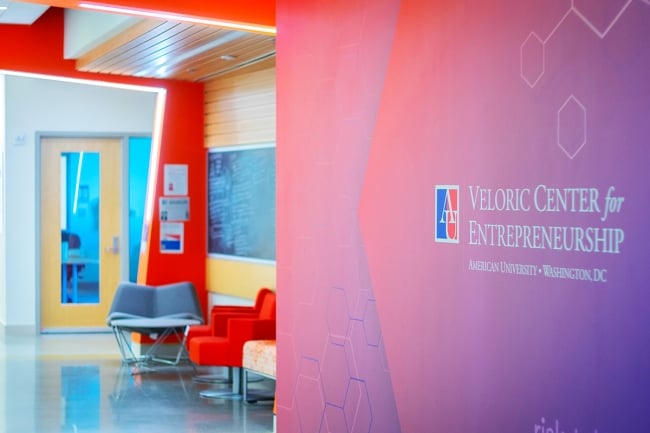You have /5 articles left.
Sign up for a free account or log in.

The Veloric Center for Entrepreneurship has scaled over the years to include more students across campus, additional resources for innovation and supports for learners.
Tommy White / American University
Like any good startup, a college’s entrepreneurship program requires time, resource investment and creative thinking. At American University in D.C., the Kogod School of Business launched an entrepreneurship initiative in 2014 that has grown over the past decade to include an undergraduate minor, business incubator and regular campus-wide programming.
The growth of the Veloric Center for Entrepreneurship lies in cross-departmental collaboration, a student-centered vision and perseverance, says Tommy White, senior lecturer and director of the center.
Survey Says
Half of Gen Z (ages 16 to 25) say they’re interested in becoming entrepreneurs or starting their own business, according to an October 2023 study from Morning Consult and Samsung.
To succeed as an entrepreneur, survey respondents identified the top attributes they would need: a commitment to hard work (64 percent), knowing the right people (49 percent) or perseverance through challenging times (49 percent).
June data from Homebase, a small business management app, found 71 percent of young adults (18 to 24 years old) felt pressure to find a corporate job. However, around 67 percent of women and 78 percent of men have considered starting a small business.
The background: The center is housed within the Kogod School of Business at American University but open to the whole campus.
The program initially launched in 2014 as the Sustainable Entrepreneurship and Innovation Initiative and evolved in 2017 to become the American University Center of Innovation. The center was renamed in 2023 to the Veloric Center for Entrepreneurship thanks to a gift (of an undisclosed amount) from the Veloric family.
“Our key goal is to foster a culture of creativity, critical thinking, curiosity, problem-solving, risk-taking and resilience among students, faculty, staff and alumni,” White says.
How it works: The center has three key areas: promoting the ideals of an entrepreneurial mindset, facilitating a business incubator program and building entrepreneurship curriculum. Additionally, the center hosts events such as workshops, panels and talks from individual entrepreneurs.
At any given time, the center’s business incubator program supports 30 student-led startup ventures. Each student founder can engage in coaching and mentorship, which includes student and alumni entrepreneur graduates of the program. Students can receive a financial grant ranging between $1,500 to $20,000 per venture.
American University offers 11 entrepreneurship-focused classes, which can be applied to an 18-credit undergraduate minor or 12-credit specialization in entrepreneurship.
The incubator program also has a 600-square-foot workspace staffed by coaches and mentors and can provide access to entrepreneurs and industry experts within the university community.
A start-up mentality: Similar to developing businesses, the center utilized a Lean Startup Method to launch—allowing leaders to create, test and iterate ideas and pivot when necessary, which has allowed the program to scale and engage across the institution.
“The program has grown significantly, evolving from a cross-campus catalyst promoting the entrepreneurial mindset to a fully integrated cross-campus community of entrepreneurs and innovators at AU,” White says, with the center collaborating with all schools and academic programs at the university.
In 2018, the center moved into the Don Myers Technology and Innovation Building, which provides over 2,000 square feet dedicated to this work. The program is managed by part-time director and assistant director positions, plus gets support from AU’s STEM partnership Program and the AU Design and Build Lab.
Having professionals who have “walked the walk” and who hold firsthand experience with launching, growing or exiting a company is critical to the center’s mission, as well.
A newer program feature is that students can participate in competitions focused on issues such as sustainability, health technology and artificial intelligence, as well as receive an endowed entrepreneurship scholarship. In the future, a new initiative will allow learners to participate in a student-managed seed fund, providing experiential learning in investing in pre-seed and seed startup companies.
The entrepreneurship center has garnered the interest of AU alumni “who often express that they wish they had this resource when they were students,” White says. “Many of these alumni have gone on to support the program with their time and financial contributions.” The center recognizes alumni in the Entrepreneurship Hall of Fame, as well.
The Veloric family’s gift, specifically, has spurred a new era of program acceleration.
“This funding allowed our program to move off Kogod’s budget, significantly increase the funding for competition prizes and provide substantially more financial resources to student-led startups in our incubator program,” White explains.
The impact: In the first three years of the program, over 200 students participated in the center’s events. Looking at the past seven years, more than 3,000 students have been reached by the center, or around 500 learners annually, White says.
Over the past decade, the incubator program has sponsored 160 student ventures, representing more than 200 AU student founders or co-founders, a significant number of whom were women and minorities. These ventures have earned over $10 million in revenue, securing almost $6 million in external investments and obtaining over $250,000 in grant funding.
Do you have a career prep tip that might help others encourage student success? Tell us about it.




